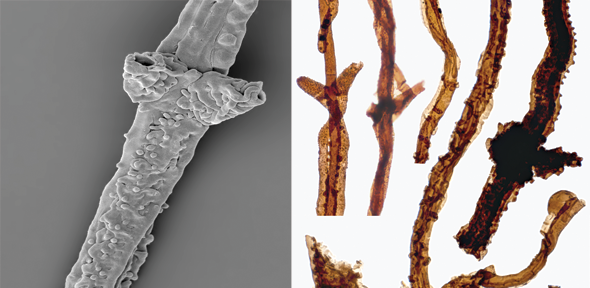It looks like you're using an Ad Blocker.
Please white-list or disable AboveTopSecret.com in your ad-blocking tool.
Thank you.
Some features of ATS will be disabled while you continue to use an ad-blocker.
10
share:
The fossil is of a fungus dating back some 440 million years and is part of what made our evolution possible , known as Tortotubus the fungus is
believed to be part of the "process of rot" that led to the formation of soil and so the development of the ecosystem that spawned us.
On the left is the fossilized Fungus and on the right it's modern day counterpart.

From small beginnings come great things.
On the left is the fossilized Fungus and on the right it's modern day counterpart.

“During the period when this organism existed, life was almost entirely restricted to the oceans: nothing more complex than simple mossy and lichen-like plants had yet evolved on the land,” said the paper’s author Dr Martin Smith, who conducted the work while at the University of Cambridge’s Department of Earth Sciences, and is now based at Durham University. “But before there could be flowering plants or trees, or the animals that depend on them, the processes of rot and soil formation needed to be established.”
It’s difficult to pinpoint exactly when life first migrated from the seas to the land, since useful features in the fossil record that could help identify the earliest land colonisers are rare, but it is generally agreed that the transition started early in the Palaeozoic era, between 500 and 450 million years ago. But before any complex forms of life could live on land, there needed to be nutrients there to support them. Fungi played a key role in the move to land, since by kick-starting the rotting process, a layer of fertile soil could eventually be built up, enabling plants with root systems to establish themselves, which in turn could support animal life.
www.cam.ac.uk...
From small beginnings come great things.
Wow that's special!
When you realize that the fungus-genetic is more ancient then the concept of ancient..
You realize God was a mushroom
When you realize that the fungus-genetic is more ancient then the concept of ancient..
You realize God was a mushroom
originally posted by: Elementalist
Wow that's special!
When you realize that the fungus-genetic is more ancient then the concept of ancient..
You realize God was a mushroom
Maybe the gods were just 'on them' and wanted to give them the first chance at life on land?!??!?!
new topics
-
Ford Motor Company sold to Elon Musk
Other Current Events: 1 hours ago -
President Biden pardons his son Hunter Biden
US Political Madness: 6 hours ago -
Biden pardons his son Hunter despite previous pledges not to
Mainstream News: 6 hours ago -
Studies show that watching a beaver eat cabbage lowers stress by 17%
Health & Wellness: 10 hours ago -
Salvatore Pais confirms science in MH370 videos are real during live stream
General Conspiracies: 10 hours ago
top topics
-
Biden pardons his son Hunter despite previous pledges not to
Mainstream News: 6 hours ago, 12 flags -
James Webb Telescope Takes a Look at the Sombrero Galaxy
Space Exploration: 14 hours ago, 11 flags -
President Biden pardons his son Hunter Biden
US Political Madness: 6 hours ago, 11 flags -
Australia passes social media ban for children under 16
Social Issues and Civil Unrest: 13 hours ago, 6 flags -
Salvatore Pais confirms science in MH370 videos are real during live stream
General Conspiracies: 10 hours ago, 5 flags -
Studies show that watching a beaver eat cabbage lowers stress by 17%
Health & Wellness: 10 hours ago, 4 flags -
Ford Motor Company sold to Elon Musk
Other Current Events: 1 hours ago, 0 flags
10
